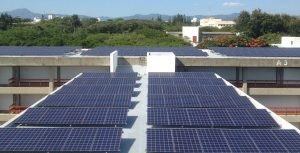Burkina Faso
The Constitution of Burkina Faso admits the principle of sustainable development. Thus, from its preamble, it affirms the absolute need to protect the environment. The National Policy on the Environment and Climate Change, implemented by the Ministry of Environment, Green Economy and Climate Change (MEEVCC), internalizes this principle.
Burkina Faso is a Sahelian country very vulnerable to the adverse effects of climate change with a vulnerability index of 61, 65 and placed 33rd among the most vulnerable countries. It is classified among the Least Developed Countries (LDCs), a group of countries whose vulnerability to climate change is very high. Its economy is heavily dependent on agriculture (30% of GDP) and natural resources, which occupies more than 80% of the population, especially at the local level. The climate emergency is therefore identified as a threat by the national planning framework and the National Economic and Social Development Plan II, 2021-2025 (PNDES II, 2021).
The climate change profile also shows that the country is exposed to three (03) main threats: (i) the extension of the Sahelian and Sudano-Sahelian zones to the detriment of the Sudanese zone; (ii) the trend and inter-annual variability of rainfall and (iii) the continuous increase in temperatures.
The combination of these three phenomena has a cumulative negative impact, particularly in terms of reducing the availability of water resources for food, hydropower, agriculture, livestock, forest production and degradation of population and ecosystem health. The analysis of vulnerability to climate change in Burkina Faso shows that the sectors of water, agriculture, livestock, forestry, health, energy, infrastructure and habitat are the most vulnerable.
For questions relating to the reduction of emissions, the evaluation of the first Nationally Determined Contribution (NDC) of Burkina Faso shows a level of achievement of the commitment for the period 2015-2020 of 91.37% for the unconditional scenario and 24.36% for the conditional scenario. Burkina Faso’s revised NDC for the period 2021-2025 presents two (2) ambitious objectives:
- Mitigation target, which aims to reduce greenhouse gas emissions;
- Adaptation objective, which aims to reduce the vulnerability of natural and human systems to the effects of real or expected climate change.
Burkina Faso, under its new ambitions, has a potential to reduce its greenhouse gas emissions by 31,682.3 Gg CO2 eq by 2030, or 29.42% compared to the trend scenario. This potential is 21,074.94 Gg CO2eq for the unconditional scenario (19.60%) and 10,557.91 Gg CO2eq for the conditional scenario (9.82%). Burkina Faso’s ambition compared to its first CDN (18.2%) has been raised by 11.22%. The key sectors identified in terms of mitigation are agro-sylvo-pastoral (AFOLU), energy (electricity production, transport) and waste.
The implementation of adaptation actions could allow a reduction of 33,072.72 Gg CO2eq, or 30.76% compared to the trend scenario.
The technical assistance activities of the SCF would mainly be training, capacity building and feasibility/prefeasibility studies in SCF eligible areas.
More specifically, the technical assistance required by Burkina Faso would concern:
- Identification and selection of projects;
- Training and capacity building;
- Study of market opportunities and constraints;
- Feasibility studies;
- Study of the main rules and regulations relating to public-private partnerships (PPP).
The areas expected for SCF Equity’s investments should relate to:
- Renewable energies and energy efficiency;
- Waste management;
- Water and sanitation;
- Nature-Based Solutions;
- Regenerative agriculture.
- Resilience and low emission of agro-sylvo-pastoral ecosystems and communities: (i) Adaptation based on aquatic ecosystems and water security; (ii) Adaptation in the health sector; (iii) Adaptation in the agro-sylvo-pastoral sector; (iv) Restoration, conservation and reforestation of agro-sylvo-pastoral ecosystems and landscapes and (v) Sustainable management of forest assets, the forest economy and access to forest products markets.
- Resilience and low emissions of towns, villages and territories: (i) Territorial planning for the management of climate risks; (ii) Low emissions in the treatment of urban waste; (iii) Renewable energy, sustainable and decentralized production and energy storage; (iv) Energy efficiency (EE) for street lighting, industry and buildings; and (v) Low emission modes of transport.
Improving climate funding: increasing climate finance in Burkina Faso to build climate mitigation and resilience capacities.
- Provision of data and information for the country’s SCF profile (22 November 2021).


